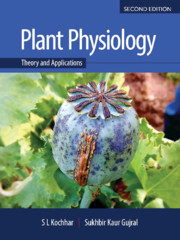Book contents
- Frontmatter
- Contents
- Foreword
- Preface to the Second Edition
- Preface to the First Edition
- Acknowledgements
- Some Common Abbreviations used in the Text
- Abbreviations for Units
- Unit I Water and Mineral Translocation in Plants
- Unit II Metabolism and Bioenergetics
- Unit III Growth and Development
- Unit IV Physiological Stress and Secondary Metabolites – Their Role in Metabolism
- Unit V Crop Physiology – An Innovative Approach
- Unit VI Breakthroughs in Plant Physiology
- Unit VII Some Experimental Exercises
- Glossary
- References
- Index
- Colour Plates
Chapter 22 - The Status and Development of Plant Physiology in India
Published online by Cambridge University Press: 12 May 2020
- Frontmatter
- Contents
- Foreword
- Preface to the Second Edition
- Preface to the First Edition
- Acknowledgements
- Some Common Abbreviations used in the Text
- Abbreviations for Units
- Unit I Water and Mineral Translocation in Plants
- Unit II Metabolism and Bioenergetics
- Unit III Growth and Development
- Unit IV Physiological Stress and Secondary Metabolites – Their Role in Metabolism
- Unit V Crop Physiology – An Innovative Approach
- Unit VI Breakthroughs in Plant Physiology
- Unit VII Some Experimental Exercises
- Glossary
- References
- Index
- Colour Plates
Summary
Plant physiology as we know, deals with different life processes operating within the cell, and interactions between the cell and the environment based upon physical, chemical and biological concepts. All these make it highly dynamic and exacting in nature. The science of plant physiology is never static but always changing as new facts are discovered and fresh concepts are developed. With new instrumentation and advances in the knowledge of working of the cell and the discovery of structure of DNA by Watson and Crick (1953), plant physiology has become first increasingly biochemical and then molecular.
A knowledge of plant physiology is essential for different fields of applied botany, whether agronomy, floriculture, forestry, horticulture, landscape gardening, plant breeding, plant pathology, or pharmacognosy. All these applied courses depend upon plant physiology for information regarding how plants grow and develop.
Until the forties, laboratories in England and Germany dominated the scientific scene and many Indian scientists began their career in these countries. However, after the Second World War, during which much of Europe was completely devastated, the focus of major research activity shifted to USA and Canada where new schools were established and many of our scientists went over there to enrich their expertise.
Compared to other parts of the world in India, the discipline of plant physiology has not received the attention it ought to have deserved but still some of our scientists earned distinction at the international level. The undisputed Indian pioneer in experimental research on plants was J. C. Bose (1858–1937), who was knighted by the British in recognition of his contributions to scientific endeavour; entitling him to the use of ‘Sir’ before his name. Basically a physicist, he was widely acclaimed for his discoveries on radio waves and wireless. But in his later years, and particularly after retirement (which to most people spells the end of one's career), Bose was also greatly interested in plant life and became hugely involved in research on plants. In fact, in 1917, he founded an autonomous institute, the Bose Institute (now among the pioneering research centres in India).
- Type
- Chapter
- Information
- Plant PhysiologyTheory and Applications, pp. 651 - 660Publisher: Cambridge University PressPrint publication year: 2020



